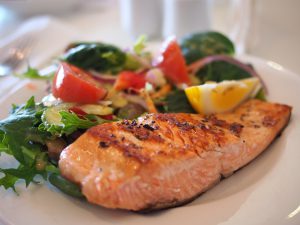What comes to mind when you hear the term “senior hunger”? I imagine, like most of us, you think of people over the age of 70 not having enough food. If so, you’re at least partially right.

Senior hunger is a broad term that has many different causes, but essentially, it means someone has a physical sensation of discomfort from lack of food. For some, it can mean living in food deserts (i.e., not having access to food because there are no grocery stores nearby); for others, it can mean living in food swamps (i.e., having limited access to healthy food options). It can also mean having access to healthy food choices but not enough money to purchase that food. Additional barriers include lack of transportation; trouble locating and accessing culturally appropriate meals; health insurance plans which do not cover medically tailored meals; and lack of kitchen utensils or equipment, such as functioning stoves, accessible countertops, user friendly utensils, etc.
In its State Plan to Address Senior Hunger, the state of Georgia defines food insecurity as “a person or household facing the threat of hunger, lacking safe and adequate food to sustain health and quality of life and unsure of the accessibility of or the capability to obtain suitable foods in socially acceptable ways.” In other words, food insecurity means someone is not able to access enough food on a consistent basis and can lead to hunger.
While it may seem like senior hunger, and other aspects of food insecurity, is its own issue, it impacts overall health outcomes, can lead to increased presence of chronic diseases, and exacerbates existing medical conditions.
So, what can be done? Or more specifically, what can you do? Rest assured, you don’t have to be a food industry professional or a senior services professional to get involved in addressing senior hunger and senior food insecurity. There are many ways to take action!
GIVE
Food pantries, community food banks, churches, and other nonprofits regularly accept financial and food donations. Check within your community to find where you might contribute. Keep in mind, this can also include your time – many direct service providers are able to succeed in their works because of volunteers. Many food banks are part of the Feeding America network and can be located using their online tool. You can also contact Empowerline to find a food pantry near you.
ADVOCATE
Team up with senior services groups and institutions to learn more about how to get issues in front of your elected officials. Meals on Wheels America also has ideas to get you started.

LEARN
Learn more about how food works in your community. Are there community gardens or urban farms in your area? What might it take to partner with neighbors and community agencies to create them? How might you contribute to sustaining local food sources? Who are the older persons in your neighborhood who may be food insecure?
The Atlanta Local Food Initiative (ALFI) is one coalition in metro Atlanta working to improve the area’s food system, and Gilliam Farm is one example of an urban farm in metro Atlanta.
ACCESS FOOD RESOURCES IN YOUR COMMUNITY
In many places, including the metro Atlanta area, people are not always aware of support options that may be available for older individuals experiencing hunger or food insecurity. And unfortunately, many social service agencies are not even aware of what other agencies provide or the qualifying criteria to participate in their programs. If you or a loved one is experiencing hunger or food insecurity, Empowerline can help connect you to food resources in your area. Learn more about ways you can enjoy a nutritious meal.


